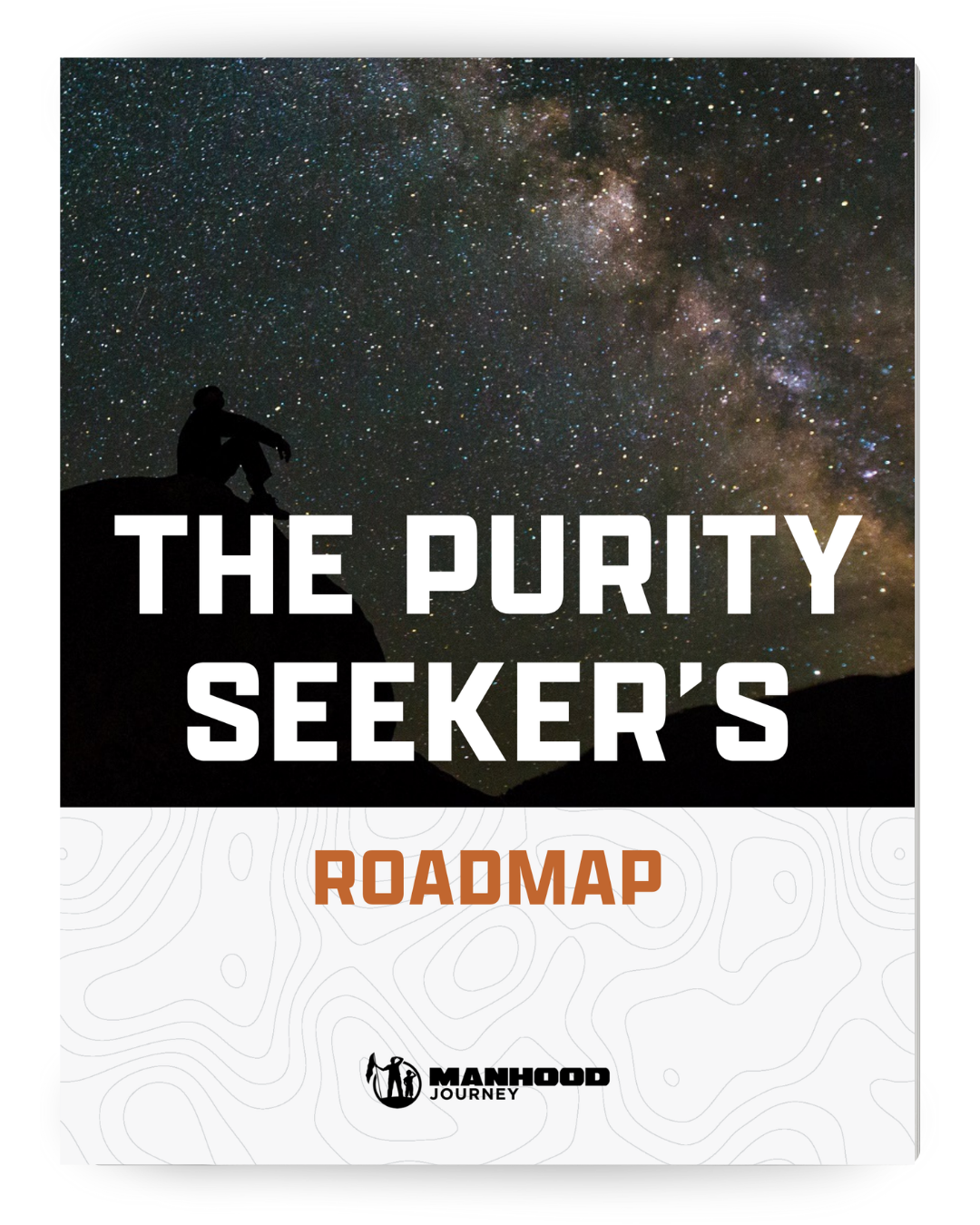While lust is not defined explicitly in the Bible, examples are shown throughout, with the first one being traced back to the Garden of Eden. After all, Satan’s strategy with Eve focused on leading her toward desiring something she couldn’t have, something she shouldn’t have. The fall in Genesis 3 is the original Bible passage about lust. It’s where the enemy first created confusion and blurred the lines between love and lust.
Of course, Satan has been using the same schemes for thousands of years because every human being is susceptible to lust in some form or fashion. For guys, it often takes the shape of sexual temptation. We see an image that sparks a thought that leads to an illicit desire. As a result, we put our lives and our homes on a slippery slope.
That’s what lust is all about, and, like every sin, the only way to overcome lust is to understand it from God’s perspective. So, focusing on what the Bible says about lust is a key step in gaining victory over the long haul.
Key Takeaways
- The Bible’s first lesson on lust appears in Genesis 3, where Satan tempts Eve by stirring desire for something forbidden.
- God’s Word is the strongest weapon a man has to battle lust, guiding him toward purity and truth.
- Lust begins in the heart, not just through physical actions, and Jesus equates lustful thoughts with adultery.
- Scripture clearly instructs believers to flee sexual temptation, modeling responses like Joseph’s.
- Pursuing purity aligns with God’s will and leads to lasting joy, while lust always carries painful consequences.
Keeping Your Way Pure
Many years ago, I came across a couple of important Bible verses about lust. In fact, these verses resonated so deeply with me that I made them my life verses:
“How can a young man keep his way pure? By guarding it according to your word. With my whole heart I seek you; let me not wander from your commandments!” (Psalm 119:9-10).
Well, I’m not a young man anymore. But I find that the battle against sin, including lust and sexual temptation, never ends. What makes these verses so important is that they identify the most powerful weapon guys have in that war. We have God’s Word.
Scriptures about overcoming lust and sexual temptation ground us in the truth. They remind us about what’s right in God’s eyes and light our path. They protect our purity and challenge us to seek God more deeply. We are less likely to wander from God when we refuse to wander from His Word.
Lust in the Bible
So, what does the Bible say about lust? What does it reveal about fighting—or, better yet, avoiding—sexual temptation? Here are four practical principles related to lust. They are grounded in the truth of Scripture. Letting them take root in our hearts won’t eliminate the battle completely, but they will encourage us to keep fighting for what’s right as we walk with God.
1. Lust might not be what you think it is.
Sometimes, guys will justify their lust by focusing on actions more than attitudes. We think that because we don’t act on impure thoughts, we’re not really giving in to sexual temptation. However, Jesus blew that rationalization out of the water in the Sermon on the Mount. He said that guys who simply look at women lustfully are committing sin in their hearts (Matthew 5:27-28).
Yes, you technically may be keeping your hands off women, but the words of the classic children’s church song still apply: Oh, be careful, little eyes, what you see. Whether in print, streaming, or internet searches, you can feed lust and fall into sexual sin. This not only affects you, but lust can ruin your marriage, and you need the power of God’s Spirit to resist these challenges.
2. Jesus died for our lust.
As Christians, we like to say that Jesus died on the cross for our sins. And that’s 100 percent true. On Calvary, Christ became our sacrifice. He opened the door to salvation by taking on every sin any of us ever committed—or ever will commit (2 Corinthians 5:21).
That includes sexual sin. Among the many Bible verses about lust, Paul included that particular iniquity when he wrote about putting sins to death (Colossians 3:5). We put sins to death by dying to them ourselves and choosing to surrender our lives to Christ. We become what Paul called in his letter to the Romans, “a living sacrifice” (Romans 12:1-2).
3. We should avoid tempting situations.
In Genesis 37, Joseph’s brothers sold him into slavery. A couple of chapters later, we discover that God had blessed him and allowed him to become the head of his master’s household. We also see that his master’s wife had developed more than a passing interest in the young Hebrew newcomer (Genesis 39:7).
Day after day, Joseph protected his integrity by rejecting her advances. When she finally forced herself on him, Joseph did the most sensible thing he could imagine: He ran (Genesis 39:10-12).
We might think running from temptation is a wimpy response, but this Bible passage on lust makes it clear that it worked for Joseph. And centuries later, Paul encouraged both the believers in Corinth (1 Corinthians 6:18) and his friend Timothy (2 Timothy 2:22) to flee tempting situations. So, the Bible is pretty clear: One of the most effective ways to overcome lust and sexual temptation is to avoid it altogether.
4. Purity is God’s will.
Through the centuries, thousands of sermons have been preached, articles have been written, and books have been published to help Christians identify God’s will for their lives. Sometimes, though, the Bible plainly states that a particular path is part of God’s will for everyone.
Sexual purity is one of those things. Paul told the Thessalonian church, “For this is the will of God, your sanctification: that you abstain from sexual immorality; that each one of you know how to control his own body in holiness and honor, not in the passion of lust like the Gentiles who do not know God” (1 Thessalonians 4:3-5).
You may wonder about other things being God’s will, but you never need to question what He thinks about sexual integrity. This and other Bible verses about lust and sexual temptation assure us that pursuing purity pleases Him.
Truth or Consequences
Honestly, these four principles probably just scratch the surface when it comes to examining what the Bible says about lust and sexual temptation. But these truths should whet your appetite to dig into God’s Word and learn more about the implicit definition of lust in the Bible.
But here’s one more thing to remember about lust: Like every sin, it comes with a high price. Two additional biblical passages about lust drive that home. In Proverbs 7, Solomon (the wisest man who ever lived) shared a story about a young man who found himself in the wrong place at the wrong time.
He played with fire and ended up being burned. The temporary pleasures of his seduction ended in disaster. Solomon compared him to an ox heading off to slaughter and a deer walking into a trap. Ultimately, his lack of discernment would cost him his life (Proverbs 7:22-23).
Maybe Solomon could paint such a vivid picture because he knew what happened to his father, David. The king, described as being a man after God’s own heart (1 Samuel 13:14), surrendered to lust, committed adultery, and later initiated a homicidal cover-up (2 Samuel 11). Eventually, David found forgiveness, but his sin tore his family apart.
Regardless of what we might think in the heat of the moment, Bible verses about lust remind us that we have a choice. We can embrace truth, or we can fall for the lies that Satan has been spewing since Eden. We can live in purity, or we can serve our sinful desires.
One produces joy in the midst of our challenges, while the other leads to suffering.
Related Questions
What does Jesus say about lust?
Jesus makes it clear in Matthew 5:28 that lust is a heart issue—looking at someone with lustful intent is equal to committing adultery in the heart.
What are examples of lust?
Lust shows up in many forms: lingering over explicit content, fantasizing about someone, or objectifying others instead of honoring them.
What is the root cause of lust?
At its core, lust is a counterfeit craving—a selfish desire for sexual intimacy.
What are the triggers for lust?
Lust is often triggered by isolation, boredom, unchecked media intake, unresolved wounds, or failing to guard our eyes and thoughts daily.















